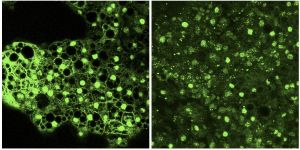El tejido adiposo es el principal órgano de almacenamiento de grasa y desempeña un papel fundamental en la regulación del metabolismo sistémico y en las enfermedades relacionadas con la obesidad. “Un tejido adiposo disfuncional puede inducir un exceso o una reducción de la grasa corporal (también llamada lipodistrofia). En este estudio, identificamos que la delgadez de los ratones mutantes se debe a una disminución del tejido adiposo y baja presencia de lípidos en sangre, incluso cuando sus condiciones de alimentación incluyen una dieta rica en grasas”, explica el investigador del CSIC.
Además, Gema Medina-Gómez, científica de la Universidad Rey Juan Carlos comenta: Hemos visto que cuando se realizan estudios del gasto energético e ingesta de los animales en jaulas metabólicas, los ratones mutados tienen más dificultades para utilizar los lípidos de la dieta de forma eficiente. Prefieren utilizar hidratos de carbono”. Otro de los interesantes hallazgos del estudio para Guadalupe Sabio, investigadora del Centro Nacional de Investigaciones Cardiovasculares (CNIC) es que “la alteración de la grasa, además de provocar delgadez, resulta en una ligera hipotermia en estos animales”.
Estos resultados, si bien se han obtenido en ratones experimentales, pueden tener importantes implicaciones terapéuticas en patologías metabólicas. Este modelo difiere de otros modelos de ratones lipodistróficos previamente publicados y podría constituir un nuevo sistema para la investigación y desarrollo de intervenciones terapéuticas dirigidas. “El desarrollo de este modelo puede ser muy útil para entender mejor la regulación del almacenamiento y la distribución de la grasa", explica María Ángeles García-López, también investigadora del CNB-CSIC y primera autora de la investigación.
La obtención de estos datos se ha logrado mediante la combinación de diferentes tecnologías punteras, y la colaboración con los grupos de investigación de Guadalupe Sabio en el Centro Nacional de Investigaciones Cardiovasculares y de Gema Medina-Gómez en la Universidad Rey Juan Carlos de Alcorcón.
Más información
María Ángeles García-López, Alfonso Mora, Patricia Corrales, Tirso Pons, Ainhoa, Sánchez de Diego, Amaia Talavera Gutiérrez, Karel H. M. van Wely, Gema Medina-Gómez, Guadalupe Sabio, Carlos Martínez-A, Thierry Fischer. DIDO is necessary for the adipogenesis that promotes diet-induced obesity. Proceedings of the National Academy of Sciences (PNAS)DOI: 10.1073/pnas.230009612






